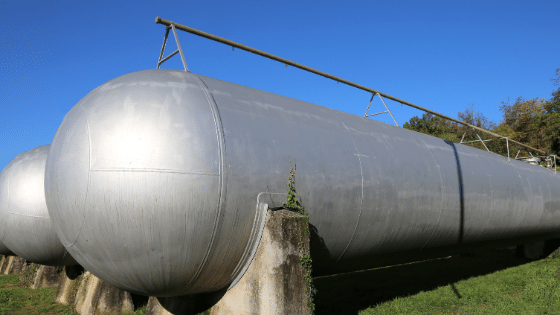A516 is the most popular pressure vessel steel plate in the industry and Kloeckner Metals is proud to supply it routinely across our nationwide network of branches.

A516 steel plate is the most popular pressure vessel quality steel plate. Though it comes in different grades, A516-70 is the most common. It is suitable for use in moderate and lower temperature applications and where notch toughness is important. It offers an excellent combination of strength, notch toughness, and weldability.
A516 is a high value pressure vessel quality steel plate that provides good notch toughness. It offers excellent weldability and can tolerate moderate to lower temperatures. One disadvantage is that it is not easily formed or machined.
The grade meets high standards required by oil, gas, and petrochemical industries for use in boilers and pressure vessels.
The grade is excellent for use in pressure vessels and industrial boilers. It is also great for other applications requiring high notch toughness and moderate to low temperature conditions.
A516 has fair machinability.
It has excellent weldability.
A516 is heat treatable.
A516 is a high value pressure vessel quality steel plate that provides good notch toughness. It offers excellent weldability and can tolerate moderate to lower temperatures. One disadvantage is that it is not easily formed or machined.
The grade meets high standards required by oil, gas, and petrochemical industries for use in boilers and pressure vessels.
The grade is excellent for use in pressure vessels and industrial boilers. It is also great for other applications requiring high notch toughness and moderate to low temperature conditions.
A516 has fair machinability.
It has excellent weldability.
A516 is heat treatable.
There are four grades of this steel: 55, 60, 65, 70. 70 is the most widely used pressure vessel quality carbon steel plate. Tensile strength is one of the primary differences between grades. Grade 70 has a tensile strength between 485 – 625 MPa, which is the highest of all the grades.
A516 steel is the American Society for Testing and Materials (ASTM) designation for Pressure Vessel Quality (PVQ) carbon steel plate with a tensile strength between 380 – 620 MPa, depending on the grade. Because PVQ steel is specifically meant to contain gasses or liquids at elevated pressures, they require chemical composition and material properties at a higher standard.
Grade 70 is the highest strength. The three other grades, including grade 60, all have lower tensile strengths. Grade 60 has a tensile strength between 415 – 550 MPa, compared to grade 70 with a tensile strength between 485 – 620 MPa.
There are four grades of this steel: 55, 60, 65, 70. 70 is the most widely used pressure vessel quality carbon steel plate. Tensile strength is one of the primary differences between grades. Grade 70 has a tensile strength between 485 – 625 MPa, which is the highest of all the grades.
A516 steel is the American Society for Testing and Materials (ASTM) designation for Pressure Vessel Quality (PVQ) carbon steel plate with a tensile strength between 380 – 620 MPa, depending on the grade. Because PVQ steel is specifically meant to contain gasses or liquids at elevated pressures, they require chemical composition and material properties at a higher standard.
Grade 70 is the highest strength. The three other grades, including grade 60, all have lower tensile strengths. Grade 60 has a tensile strength between 415 – 550 MPa, compared to grade 70 with a tensile strength between 485 – 620 MPa.
Steel base plates are fundamental elements employed in various manufacturing processes. These flat, rectangular...
Metal fabrication is a critical process that transforms raw metal materials into finished products....
The solar industry has undergone a significant transformation by incorporating steel products into various...
The unprecedented pace of solar growth is challenging and reforming America’s construction and engineering...
If you’ve got a roof over your head, it’s partly thanks to purlins. A...
Acquiring highly profitable company with annual sales of around USD 30 million Significant expansion...
A stainless steel depot is a specialized facility or supplier that stocks and provides...
American manufacturers use about 28.2 billion pounds of aluminum every year, 41.6% of it...
Leading steel distributor expands commitment to sustainability in the North American market. Kloeckner Metals,...
At Kloeckner, we are excited to announce that our Santa Fe Springs, CA location...

X
The Kloeckner Metals website uses modern technologies. Unfortunately, your browser doesn't support those technologies.
Download the latest version of one of these browsers to experience the site: